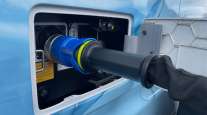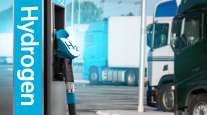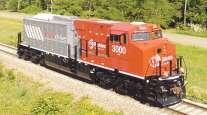Senior Reporter
Hydrogen or Electric Batteries? There's No Clear Answer

[Stay on top of transportation news: Get TTNews in your inbox.]
AUSTIN, Texas — Transportation experts agree that there is no single answer for which alternative power source is best to carry the trucking industry to a zero-emission future, especially as questions remain about fueling and power infrastructure, and access to raw materials.
In particular, there are serious questions about the volume of critical minerals needed for battery-electric vehicles, and whether the needed recharging or refueling infrastructure will be ready for prime time.
Despite the concerns, there seems to be optimism that both hydrogen and battery-electric could each offer a solution in their own right, according to a panel of experts speaking at an Oct. 15 educational session at American Trucking Associations’ 2023 Management Conference and Exhibition.
“I think it’s not essentially a competition,” said Kevin Miller, a panel member and senior adviser of business models at the U.S. Joint Office of Energy and Transportation. “From a federal context I think you can focus on both fuels. I think it’s an exciting time for both hydrogen and electric batteries.”

Katie Ellet says, "There are plenty of cases where a traditional battery just isn’t the best fit." (John Sommers II for Transport Topics)
The Joint Office, a critical component of the bipartisan infrastructure law, aligns resources and expertise between the Department of Energy and the Department of Transportation. The office provides support and expertise to a multitude of programs that seek to deploy a network of electric vehicle chargers and zero-emission fueling infrastructure.
“It’s finding the right tool for the job for the customer need,” said Katie Ellet, president of Air Liquide Hydrogen Energy and Mobility North America. “There are plenty of cases where a traditional battery just isn’t the best fit. When you need a faster fueling time, when you have a higher payload, when you need longer hauls you don’t have time to sit and charge.”
She added, “When you do need faster fueling, when you maybe have temperature concerns, those are the types of places where a fuel cell makes a lot of sense.”
Ellet said she believes both fuel- and battery-makers can work together.
“It’s all about risk. Motor carriers can’t take the risk to buy a zero-emission truck without a refueling infrastructure, and a fueling station can’t build a charging structure without a truck,” she said.
Miller referred to an Oct. 13 announcement by Energy Secretary Jennifer Granholm as evidence that hydrogen is making strides. The announcement said that seven regional clean hydrogen hubs were selected to receive $7 billion in funding to accelerate the domestic market for low-cost, clean hydrogen. The hubs aim to produce more than 3 million metric tons of clean hydrogen per year, achieving nearly one-third of the 2030 U.S. clean hydrogen production goal, the announcement said.
Miller said the transportation sector “is going to be asking themselves what’s the least amount of fuel I need to complete my routes and what’s the cheapest way to get it.”
“That answer is going to be different based on use case across the board,” Miller said. "Different vehicle classes, on-road, non-road, shorthaul, longhaul. As we answer those questions we need to be informed by what do we need where? The public policy approach if you build it they will come is not a great strategy.”
Want more news? Listen to today's daily briefing below or go here for more info:





